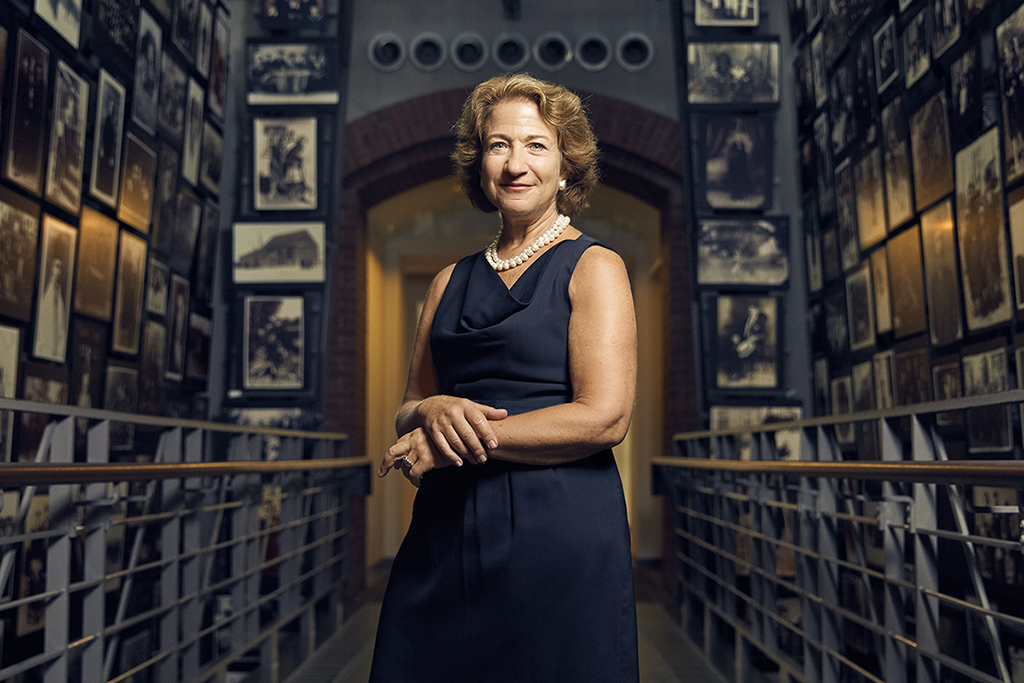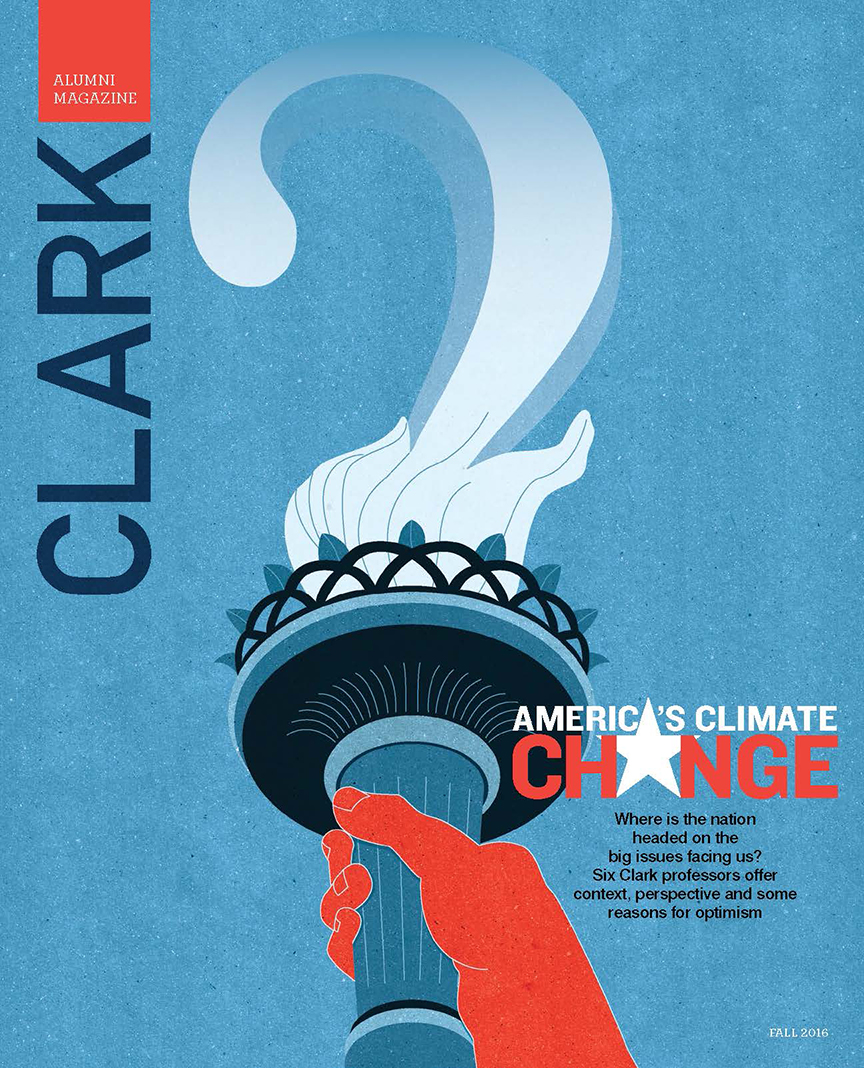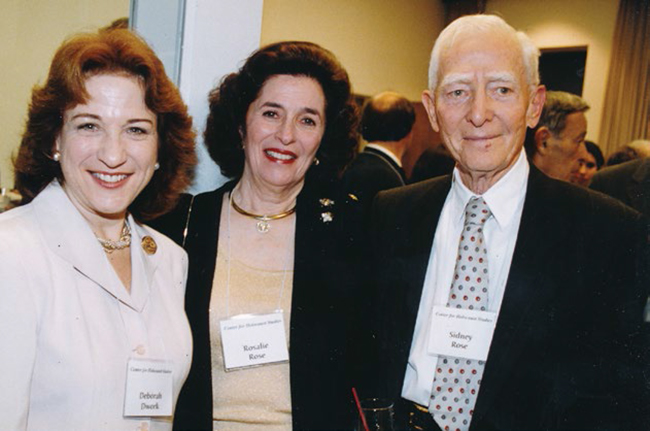Longtime Strassler Center Director Debórah Dwork charts a new path

The bus rumbled along the road from Warsaw to Auschwitz, a three-hour trip connecting grim reminders of the Nazis’ murderous campaign against Jews during World War II.
The passengers were participants in a multi-day conference convened by the Jewish Foundation for the Righteous in July 1993. During the ride, David Strassler, MBA ’11, a member of the JFR board and chair of the Clark University Board of Trustees, chatted with his seatmate, a Yale University professor whose acclaimed contributions to Holocaust studies had emerged from the hundreds of oral histories she’d gathered from survivors. He complimented her on the paper she’d presented, and then asked where one would go to earn a Ph.D. in Holocaust history. The woman’s answer stunned him: Such a place did not exist. No institution offered a doctorate specializing in Holocaust history.

When he returned to the United States, Strassler approached then-Clark President Richard Traina with an offer: He and his brother Robert would be willing to raise money for a center devoted to Holocaust studies if the faculty approved and if it met the University’s academic mandate. By coincidence, their efforts leveraged those of another set of brothers, Sidney and Ralph Rose, who proposed establishing a chair in Jewish studies at Clark to honor family members murdered in Poland during the war. Traina asked if they would refocus their gift to create the nation’s first fully endowed chair in Holocaust history. The Roses readily agreed.
From these serendipitous connections, the Strassler Center for Holocaust Studies was born in 1998, with the singular purpose of rooting the study of the Holocaust in academia — later expanding its mission and title to the Strassler Center for Holocaust and Genocide Studies. And from the beginning, its chief architect, its leader, its face, and its soul was Debórah Dwork, the professor on the bus from Warsaw to Auschwitz.
*****
“How could I not focus on the Holocaust?”
Debórah Dwork is responding to an interviewer’s question about her early motivations for studying this seminal event in human history. (Her next line could very well be, “Where do I start?”)
The interview has its own purpose. On May 31, after 20 years at the helm, Dwork stepped down as director of the Strassler Center for Holocaust and Genocide Studies. Now “founding director,” her journey to envisioning an academic center began with her family. Dwork’s parents were Jewish immigrants whose home language was Yiddish. Her mother’s adoptive sister, Sara, who lived in Poland, was the only member of her family who had not been murdered by the Germans. “I thought this was how all American Jewish families were constituted,” she recalls. “One leg in the United States and the other in Europe.”
While Dwork’s father established his career as a mathematician at Harvard and, later, Princeton, her family traveled back and forth to Europe. Among the places they lived was Florence, Italy, where the young Debórah soon became friends with a Jewish classmate named Wanda. One day, she accompanied Wanda’s family to the countryside, where they visited a farmer. “It took me years before I realized that Wanda’s father had been hidden by that farmer’s family during the war,” she says. “He returned every June to check on him and just to say once again, ‘ Thank you. I’m still here.’”
While working on her dissertation at University College London, Dwork had a conversation with the mother of Robert Jan van Pelt, her friend and future co-author on three books, who was visiting from the Netherlands.
“Judy and I were talking, and she said, ‘Did I ever tell you how I found food during the war?’ As a young girl — malnourished and unthreatening — Judy could forage for food without raising the Germans’ suspicions. Trash bins outside of hospitals were an excellent source for scraps, she remembered.
“I realized such stories were the stuff of family lore, not scholarly research,” Dwork says. “No historian had plumbed this kind of experience, understanding children as actors, as agents. Here was Judy going out to forage and bring back food for her family — she was on the doing end, not the receiving end.”
With Judy’s story as inspiration, Dwork embarked on the research and writing of “Children With A Star” (1991), a now-classic analysis of Jewish children’s experiences during the Holocaust that drew upon the childhood memories of hundreds of Holocaust survivors. To gather information, Dwork recorded what at the time grew to be the largest collection of child-survivor oral histories in the world; hers was a pioneering approach to a chapter in history that had been told exclusively through an adult lens. The book has been translated into many languages and was the subject of a Canadian Broadcasting Corporation documentary.
In 1986, during her first professorship at the University of Michigan-Ann Arbor, Dwork had begun offering courses on the history of the Holocaust, a topic that periodically found its way into college curricula but which didn’t exist as a subfield of the larger discipline of history.
“I kept saying to anyone who would listen, and those who wouldn’t: ‘This is a hugely important period of history, and we’re not offering courses about it.’”
The argument for a doctoral program in Holocaust history was crystallized when the cornerstone was laid in 1988 for the United States Holocaust Memorial Museum in Washington, D.C. “If you go to the Italian Renaissance collection in the Metropolitan Museum of Art, you expect the curator to have a Ph.D. in art history. You even expect that curator to have specialized in Italian Renaissance art,” she says. “So here was this Holocaust museum to be built on the National Mall, and please tell me: Who was going to serve as the curators?”
Flash forward to that bus trip to Auschwitz, and the moment David Strassler turned to her and asked where a Ph.D. program in Holocaust history was offered.
“I said to him, ‘I’ve been waiting my whole life for someone to ask me that question.’”
*****

Dwork was hired in 1996 to plan and launch a center for Holocaust studies — one that would need a building, a program, and students.
She hit the ground running, forging relationships, fundraising (she reckons she has raised from $25 million to $30 million for the center over the years), and developing a plan for a doctoral stream in Holocaust history. “Yes, this was groundbreaking, but I could break that ground only because our Clark community was willing,” Dwork says.
The Center found its home in an aging Victorian at the corner of Woodland and Hawthorne streets that had served as alumni offices. Marc ’81 and Cathy ’83 Lasry donated funds for the redesign and renovation, which was undertaken by architect Julian Bonder, who designed the Center’s Rose Library at the same time.
Among the first class of Ph.D. students admitted in 1998 was Beth Cohen, who today teaches at California State, Northbridge, and is writing her second book, “Child Survivors of the Holocaust.”
“The experience of being a student of Debórah Dwork’s was stimulating, exhilarating, terrifying, and — I don’t use these words lightly — life-changing,” Cohen recalls. “Exhilarating was exposure to major thinkers in Holocaust history like Yehuda Bauer, Christopher Browning, Marion Kaplan, and Atina Grossman, who came to the first scholars’ conference Debórah organized in 1999. Terrifying was the experience of presenting a paper at the second conference in October 2001 on Genocide in the 20th Century to a room full of invited scholars, including one whose work I analyzed.
“Debórah’s seminars had a demanding bibliography and writing requirement — her exacting critiques of my essays still guide my writing today.”
As the Strassler Center’s programming evolved, its reputation grew. In tandem with the work emerging from the Center, Dwork’s own scholarship — she is the author of eight books and many articles, and is in frequent demand as a speaker — made her the Center’s ambassador on an international stage. She attracted renowned scholars to the Clark campus, including Bauer, the preeminent Holocaust historian, who taught for two semesters at the Strassler Center.
“My experience in Worcester was very important,” he says. “Debórah was a person who mediated and brought things together. She’s the kind of historian I appreciate — accurate, yes, but also one who makes personal connections.”
The Strassler Center’s mandate broadened in 2001 with the gift of the Robert Aram, Marianne Kaloosdian, and Stephen and Marian Mugar Chair in Armenian Genocide Studies (held today by Taner Akçam). While the Center always featured an undergraduate concentration in genocide studies, it could not claim expertise beyond the Holocaust on the doctoral level. The gift changed that. “I always wanted our bona fides to be concrete,” Dwork says. “We changed the name immediately to the Strassler Center for Holocaust and Genocide Studies.”
When the news was announced, Dwork received a handwritten note from friend and mentor Elie Wiesel, the renowned author, scholar, and Nobel Laureate whose own experience as a survivor of Hitler’s death camps informed his lifetime of activism. The note contained a single word: “Bravo.”
This larger vision was prominently displayed at the Informed Activism conference, which the Center hosted in the fall of 2011 to grapple with issues surrounding the link between mass violence and mineral extraction in Congo. An international roster of scholars, activists, political leaders and survivors analyzed chilling testimony and discussed solutions targeting the underlying causes of violence before an audience of over 1,000 who filled the Kneller Athletic Center.
This year, the Strassler Center awarded its first doctorates in comparative genocide studies — Khatchig Mouradian, the first person in the United States to earn a Ph.D. in Armenian genocide history; Ümit Kurt, also focusing on the Armenian genocide; and Sara Brown ’05 (the genocide in Rwanda), who took her first course at the Center as a sophomore and later returned to pursue her doctorate.
“Debórah was with me from start to finish, urging me on with her indefatigable guidance and unwavering faith,” says Brown, who is a lecturer at San Diego State University.
Peter Balakian, the Pulitzer Prize-winning poet and Armenian genocide scholar who has spoken at the Strassler Center, calls Dwork a “great force” in comparative genocide studies. “She made so much happen, and with such grace and affirmative energy.”
*****
Dwork quips that her Ph.D. students thrive under a number of collective titles, from “the Strassler Mafia” to “DD’s Army.” They deploy from a university whose modest size has distinct advantages, including the interdisciplinary approach that allows the Center to collaborate with scholars from psychology, history, geography, and sociology to more deeply investigate and better understand acts of mass brutality. The U.S. Holocaust Memorial Museum employs so many former Strassler students that she refers to it as “Strassler south.”
Stepping down as director required careful consideration, but Dwork made the decision with confidence in her successors, co-directors Thomas Kühne and Mary Jane Rein. Kühne holds the Strassler Chair in the Study of Holocaust History and serves as director of the Holocaust and genocide studies doctoral stream. Rein has been the Center’s executive director since 2006.
“I really believe in succession plans,” Dwork says. “Transitioning out at the right time is the responsibility of, and a gift from, the leader of the organization. If the director remains too long, the organization becomes associated with that person and not for itself. Happily, that would not have happened with the Strassler Center because, in the end, our fortunes depend on the scholarship of our students. Still, it was time to step down.”
On sabbatical until September 2017, Dwork is scarcely idle. This fall, she served as the historian of record in the Ken Burns documentary “Defying the Nazis: The Sharps’ War,” and has devoted herself to her first passion — plumbing the history of the Holocaust. When weighing the decision to relinquish her administrative duties, Dwork says she faced the question, “Budgets or books?” The latter won.
She continues in her role as Rose Professor of Holocaust History and is working with nine Ph.D. candidates.
“I’ve loved building the Center and imagining what it could be,” she says. “We had one standard — excellence — and everyone bought into that, including our donors. Indeed, fundraising gave me the opportunity to meet people whose values aligned with mine, who were generous of spirit and pocket, and who helped make this a reality.”
Perhaps it’s most appropriate to conclude with Debórah Dwork’s fellow bus passenger from 23 years ago, who has watched the journey unfold.
“I’ve done a lot of things in my life, but the founding and evolution of the Center is the thing I’m most proud of,” says David Strassler. “Debórah has been the dynamo with the smarts and the drive to make it what it is today, and that impact is seen in our graduates. They spread their knowledge as professors, as docents, as curators, so when the survivors are gone, the history is not forgotten.”


